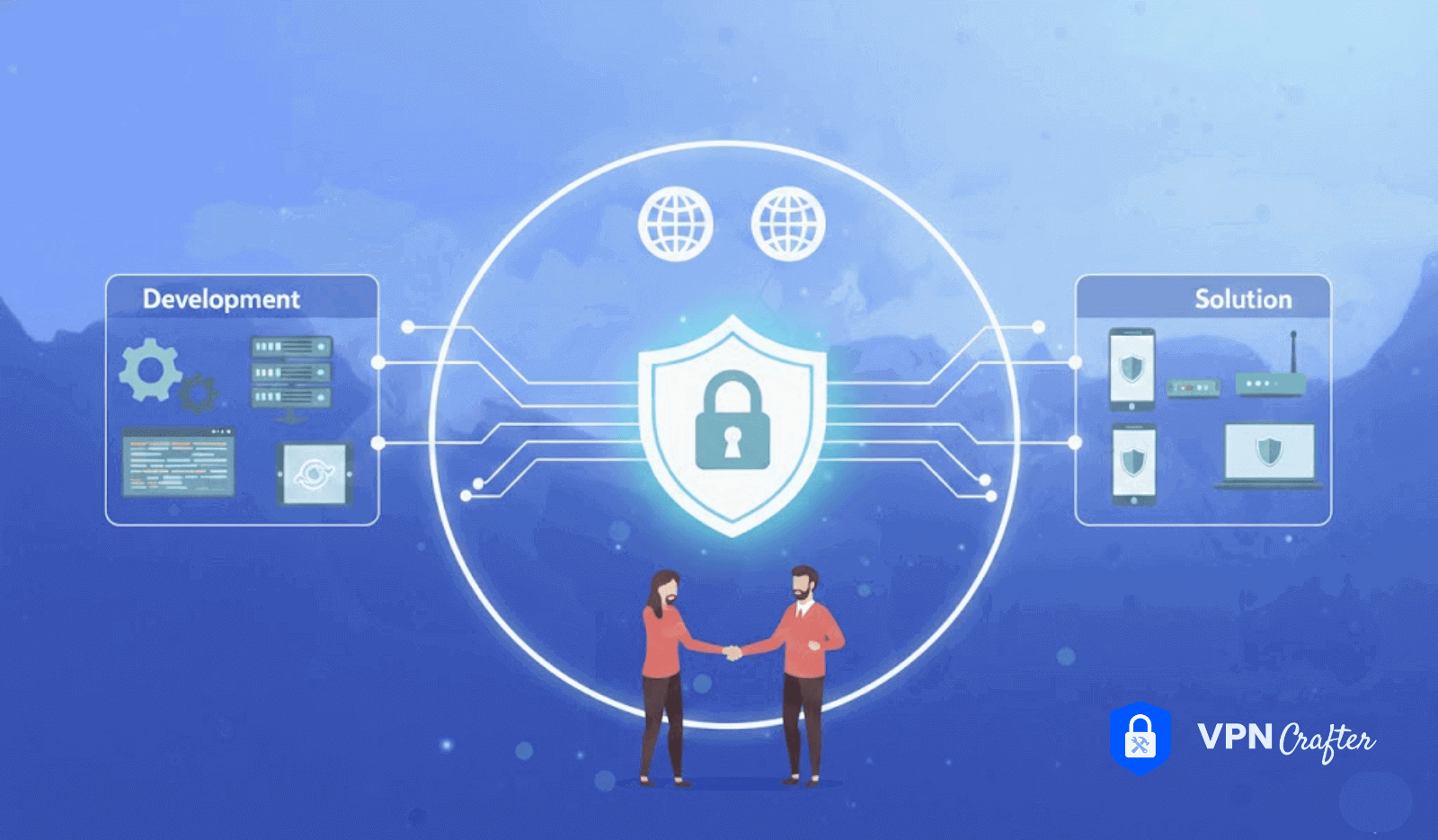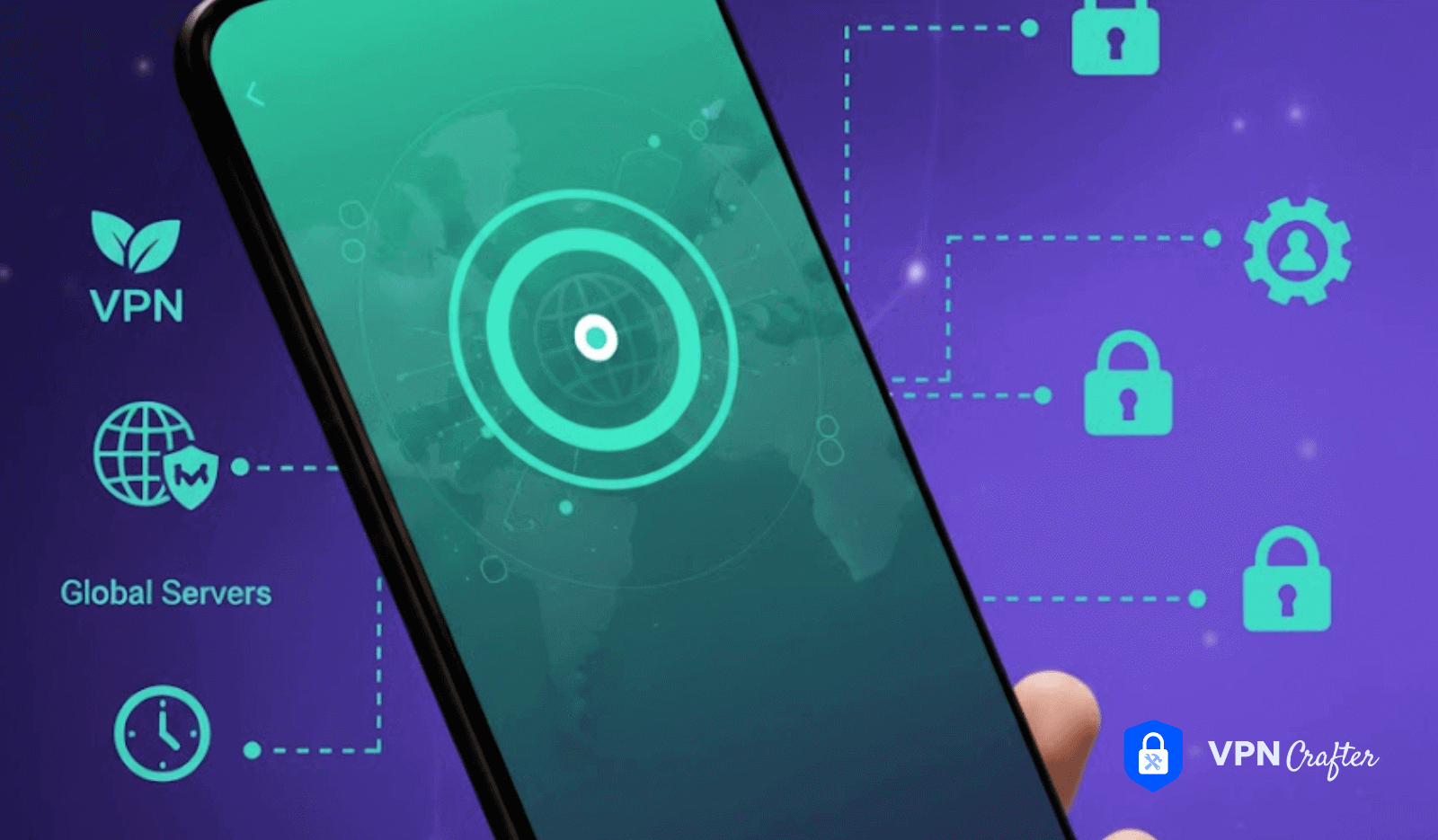Starting a VPN business might sound complicated, especially if you’re not tech savvy. You might think you need to understand coding, networking or server management to even get started. That used to be true but not anymore.
Today many VPN providers like VPN Crafter offer white label reseller programs that handle all the technical stuff for you. That means you can focus on growing your brand, finding customers and making sales without worrying about the backend.
In this blog post, you’ll learn how to become a VPN reseller step by step even if you have zero technical knowledge. It’s easier than you think and the opportunity is growing fast.
Benefits of Becoming a VPN Reseller
Becoming a VPN reseller offers numerous benefits, especially for entrepreneurs, agencies, and businesses looking to expand their service offerings or generate passive income. Here are some of the key advantages.
Recurring revenue stream
One of the most attractive advantages of becoming a VPN reseller is the ability to generate recurring revenue. Unlike one-time product sales, VPN services are typically offered on a subscription basis—monthly, quarterly, or annually. This means that once you acquire a customer, you can earn continuous income for as long as they stay subscribed. This model provides more predictable cash flow, which is essential for long-term business planning and growth. The more clients you onboard, the more stable your passive income becomes over time.
Additionally, subscription services often allow for upselling opportunities, such as family plans, multi-device options, or premium bandwidth tiers. As customers grow more reliant on their VPN, especially in areas where internet censorship or privacy threats are high, their likelihood of renewal increases. By nurturing your subscriber base and occasionally offering exclusive deals or loyalty rewards, you can improve customer retention and reduce churn, further stabilizing your revenue stream.
Low startup cost
Becoming a VPN reseller doesn’t require building the infrastructure from scratch—no servers, no data centers, no complex networking. You simply partner with a VPN provider that already has all the systems and networks in place. Most providers offer reseller or affiliate programs that let you start selling with minimal upfront investment. This makes it a low-risk opportunity for entrepreneurs, small businesses, or digital agencies looking to expand their offerings without large financial commitments.
Unlike tech-heavy startups, the barrier to entry here is low. You won’t need to hire a team of developers or invest in expensive cybersecurity infrastructure. The parent VPN provider handles backend development, server maintenance, and feature updates. Your main focus becomes customer acquisition, branding, and support. As a result, it’s a highly cost-effective business model, particularly for individuals or agencies that want to start small and grow organically.
Brand customization (White Labeling)
Many VPN providers allow resellers to white-label their services, meaning you can rebrand the VPN with your own business name, logo, website, and design. This offers a major advantage for businesses wanting to build brand equity and create a stronger identity in the privacy and security space. Instead of promoting a third-party company, you build loyalty and trust under your own label, giving your business more credibility and professional appeal.
With full control over pricing, customer onboarding, and marketing, you can tailor the VPN offering to suit different customer segments or even niche markets. For example, you can brand it specifically for gamers, travelers, journalists, or small businesses with unique security needs. This branding freedom not only boosts your perceived value but also gives you the ability to create your own support channels, terms of service, and packages, adding a personal touch to the customer experience.
High demand and growing market
VPN services are in higher demand than ever before. With growing awareness about online privacy, data leaks, cyber threats, and government surveillance, both individuals and businesses are turning to VPNs to secure their digital presence. In some regions, VPNs are essential tools to bypass censorship and access blocked content, while in others they’re vital for protecting sensitive data from cybercriminals. This global awareness creates a wide and ever-expanding customer base.
According to multiple industry reports, the VPN market is projected to grow significantly in the next few years, driven by increasing digital penetration and concerns over personal data safety. As a reseller, you’re not only tapping into a trend—you’re positioning yourself in a necessity-driven industry. This trend ensures that your business remains relevant and in-demand, with plenty of room to scale as more users prioritize online anonymity and freedom.
Flexible business model
Reselling VPN services can easily adapt to various business models. If you already offer web hosting, SEO, or digital marketing services, VPNs can be bundled in as an added-value offer. For freelancers or agencies, it can be introduced as a new product line to diversify revenue. Even if you’re starting fresh, you can sell VPN subscriptions directly to consumers through your own website or via platforms like social media, marketplaces, or email marketing.
This flexibility means you can approach different audiences with tailored solutions. For instance, digital nomads and remote workers need secure access to public Wi-Fi; small businesses want to protect their internal data; parents might look for protection for their kids’ internet usage. With the right messaging and positioning, you can create unique marketing funnels for each segment and test various pricing models or promotional strategies until you find the most profitable one.
No technical expertise required
You don’t need to be a cybersecurity expert or a networking engineer to become a VPN reseller. The technical complexities—server uptime, encryption protocols, DNS leak prevention, kill switches—are all managed by the parent VPN provider. They also ensure compliance with data laws and handle updates, bug fixes, and server optimizations. This means you can operate a sophisticated tech business without the need for in-house technical knowledge or a development team.
Most VPN resellers are provided with intuitive dashboards, billing systems, customer support templates, and marketing tools. This streamlines operations and allows you to concentrate on branding, client acquisition, and user satisfaction. If you do run into problems, the provider typically offers back-end support or a partner success manager to assist you. This plug-and-play approach makes the business model accessible even for beginners or solopreneurs.
Scalable opportunity
The VPN reseller model is inherently scalable. You can start with a small customer base, test your pricing and outreach strategies, and gradually scale up without drastically increasing your overhead. Since the backend infrastructure is managed by the VPN provider, your main effort is directed toward sales and marketing. This makes it easier to grow the business without being bogged down by operational bottlenecks.
As you expand, you can introduce advanced pricing tiers, offer business-focused plans, or target international markets. You may even scale your reseller business into a full SaaS company with customer support teams, affiliate networks, and automated onboarding systems. Whether you’re managing 10 customers or 10,000, the underlying VPN infrastructure remains stable and scalable, allowing you to grow your business as fast as your marketing can support.
Value-added service for clients
If you already serve clients in digital fields—like web development, IT consulting, hosting, or online security—offering a VPN can greatly boost your perceived value. It’s a practical add-on that aligns with the increasing demand for privacy and secure internet usage. When you offer a VPN as part of a service bundle, it makes your entire package more appealing and can serve as a differentiator from competitors.
For example, web hosting companies can bundle a free or discounted VPN with their hosting plans, enhancing their value proposition. Marketing agencies can offer VPNs to help clients securely access region-locked content for competitive research. IT consultants can include VPNs in their cybersecurity solutions. By integrating VPN services into your existing portfolio, you improve client satisfaction and deepen your service relationship.
Customer retention booster
Subscription-based services like VPNs naturally encourage long-term customer relationships. Because VPNs are used daily for browsing, streaming, and online work, customers tend to stay subscribed if they find the service reliable and easy to use. This creates a built-in mechanism for retention, especially when the VPN becomes part of their routine online safety habits.
Additionally, you can increase loyalty by offering exclusive deals, referral programs, and upgrade paths. When clients feel their privacy and online freedom are protected, they associate that value with your brand—particularly if you’re using a white-label model. Over time, this consistent utility increases your customer lifetime value (CLTV), making every client more profitable over the long term.
Global reach
The beauty of VPN services is that they aren’t limited by geography. You can market and sell VPN subscriptions to users across the world, especially in countries where government surveillance or content censorship is common. In fact, demand in markets like the Middle East, Asia, Eastern Europe, and parts of Africa is often higher due to internet restrictions or privacy concerns.
This global accessibility gives you the potential to scale your business internationally without the traditional challenges of localization, warehousing, or customs. With digital marketing techniques like SEO, social media, PPC ads, and influencer collaborations, you can quickly reach a global audience. By offering multilingual support and region-based pricing or servers, you can further optimize your appeal to international users and grow faster than a localized business could.
How to Become a VPN Reseller Without Technical Knowledge
Becoming a VPN reseller without technical knowledge is entirely possible and increasingly common, thanks to white-label and reseller-friendly platforms that handle all the technical heavy lifting.
Here’s a step-by-step guide on how to do it successfully, even if you have zero background in networking, encryption, or server management.
1. Choose a reliable VPN provider with a reseller program
The first step is to research VPN companies that offer reseller or white-label programs. Your goal is to find a provider that manages the entire backend infrastructure, including servers, security protocols, and customer support. These providers allow you to sell VPN services under your own brand or through their system with minimal technical involvement. Look for a platform that offers a clean and simple dashboard, white-label options, and responsive support to help you get started smoothly. Popular options include VPN Crafter Reseller.
Choosing the right provider lays the foundation for everything else. Make sure they allow you to control branding, pricing, and user management through an easy-to-use interface. Some even include tools for marketing and customer support, making them ideal for beginners who want to focus on business growth rather than tech setup.
2. Sign up and set up your reseller account
Once you’ve selected a provider, you can sign up for their reseller program. This process typically involves choosing a plan or package based on your budget and goals. After signup, you’ll receive access to a control panel or admin dashboard where you can customize your offerings, manage users, and view sales analytics. You don’t need to worry about server configuration or encryption standards. The provider handles all of that for you.
Your job is to personalize the service with your brand name, logo, pricing structure, and customer support details. In many cases, you’ll also receive pre-made materials like marketing banners, onboarding emails, and legal policy templates. This makes it easy to set up a professional-looking VPN business without needing design or coding skills.
3. Create a branded website or landing page
To promote your VPN services, you’ll need a website or landing page where users can learn more and subscribe. If you’re not familiar with web development, tools like WordPress with Elementor, Webflow, or Wix can help you create a beautiful site using drag-and-drop features. Your website should clearly present the benefits of your VPN, outline your pricing plans, and include a login or signup option that connects to the reseller system.
Focus on building trust through simple design, testimonials, and transparent policies. Add support sections or FAQs using templates provided by your VPN partner. A well-structured, mobile-friendly site makes it easier to attract and convert visitors. You don’t need to write any code or deal with complicated hosting—just plug in the tools and go live.
4. Set up payment gateway
To start earning from your VPN service, you’ll need a way to accept payments. Most reseller platforms integrate easily with major payment gateways like PayPal or Stripe. All you have to do is connect your account through their settings. You can set up different subscription tiers, such as monthly or yearly plans, and enable auto-renewals if supported.
Some platforms even take care of billing and payout processing, so you can focus entirely on sales and marketing. Whether you use a simple checkout page or integrate WooCommerce into your site, the setup is straightforward. You won’t need any technical experience to handle transactions, and you’ll be able to track everything through your reseller dashboard.
5. Focus on marketing and sales
Since the technical part is handled for you, your main job becomes promoting the service and acquiring customers. You can drive traffic through search engine optimization by targeting keywords like “best cheap VPN” or “VPN for streaming.” Social media marketing, paid ads on Google or Facebook, and influencer partnerships are also great ways to get attention.
If you already run a business like web hosting, digital marketing, or consulting, VPN can be bundled into your existing services. The key is to understand your target market and position the VPN as a valuable, privacy-focused solution. As you grow, consider using email campaigns or referral incentives to build momentum and increase customer loyalty.
6. Offer basic customer support or use the provider’s team
While the technical aspects of the VPN are managed by the provider, you might still need to handle basic customer questions related to billing, login issues, or account setup. Many providers offer ready-made FAQ sections, canned responses, and knowledge base articles that you can repurpose on your own site.
If you prefer, some providers offer customer support as part of the white-label service, meaning they’ll handle user issues for you. Alternatively, you can use tools like Tawk.to or LiveChat to manage live conversations or outsource support once your business starts to grow. Even with minimal knowledge, you can maintain a good support experience by relying on the tools and templates provided.
7. Analyze and grow
As your VPN business gains traction, use the analytics tools provided in your reseller dashboard to monitor performance. You can track new signups, user activity, retention rates, and overall revenue. This data helps you make informed decisions about pricing, marketing, and user experience.
Refine your strategies based on what works. If one plan is popular, consider promoting it more aggressively. You can also experiment with discounts, bundle offers, or limited-time promotions to boost conversions. The more you understand your customers and optimize your business, the faster it will grow—all without having to touch a single server.
Final Thoughts
Becoming a VPN reseller without technical knowledge is not only possible but also increasingly accessible thanks to user-friendly platforms that handle all the complex backend tasks. You don’t need to worry about managing servers, configuring encryption, or dealing with network infrastructure. Instead, your role focuses on branding, setting up a simple website, connecting payment systems, and promoting your service. Most reseller programs offer everything you need, including support, ready-made tools, and automated systems, so you can start quickly and grow confidently.
As the demand for online privacy continues to rise, this is a great time to enter the market. With consistency in marketing, good customer service, and a reliable VPN provider, you can build a scalable business that generates recurring income without ever needing deep technical skills. The key is to focus on value, trust, and user experience while letting the technology work in the background.





